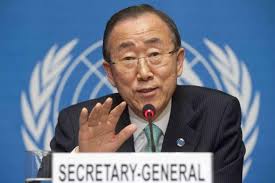New parliamentary plan for Somalia praised by UN chief

Thursday’s announcement by the Somali government that it will embrace a new parliamentary system later this year has been welcomed by the UN Secretary-General.
Ban praised the commitment to create a new two-tier parliament, where 30 per cent of the seats will be reserved for women.
The decision by the Somali government came after broad-based consultations involving traditional elders, regional administrations and civil society.
The federal government took office in 2012, but prior to that Somalia had been in a state of clan-based civil war since the early 1990s.
Ban urged Somalis to support political reforms and move towards a fully democratic system based on universal suffrage by 2020.
More than 40 per cent of the population still relies on food aid, including more than a million who are internally displaced due to continued fighting.
This year’s El Niño “as strong” as 1997 when 23,000 died.
This year’s El Niño weather system could wreak as much havoc as the so-called “super El Nino” of the late 1990s, when 23,000 people died worldwide.
That’s the verdict of the UN’s Deputy Emergency Relief Coordinator, Kyung-wha Kang, speaking in Ethiopia ahead of this weekend’s African Union Summit.
The “super El Niño” of 1997, left more than a million homeless, and caused damage estimated at US$45 billion, she said.
Ms Kang, who is also Assistant Secretary-General for Humanitarian Affairs, pointed to the devastating impact of the El Niño weather system in Ethiopia in the past 12 months, where 10.2 million are now in need of food assistance.
That’s compared with 3 million a year ago.
“This, at the end of the day, could be equal in terms of its destructive power,” she warned.
Refugees from Eritrea and Somalia urged to tell their “real story”
Refugees from Eritrea and Somalia have recorded the hardships they faced reaching Europe, in an effort to dissuade others from making the perilous journey back home.
The innovative community-based information project, Telling the Real Story, was launched by the UN Refugee Agency (UNHCR) on Thursday.
It’s a collection of testimonies by refugees, revealing the harsh reality of crossing the Mediterranean, where thousands have drowned.
UNHCR said that most young migrants received deliberately false information from smugglers and traffickers, who played down the dangers.
The agency hopes the real stories of trauma, robbery, extortion and violence, will counterbalance some of the misinformation.